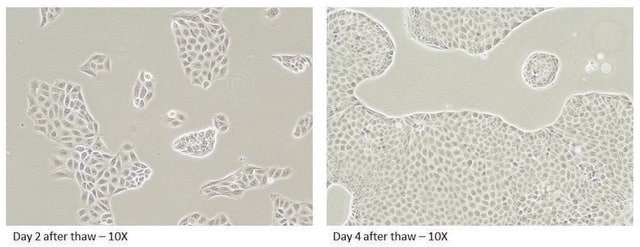MTOX1301
Canine MDR1 Knockout MDCKII Control Cells
canine kidney (cocker spaniel)
Synonym(s):
MDCKII MDR1 KO
Sign Into View Organizational & Contract Pricing
All Photos(2)
About This Item
UNSPSC Code:
12352207
NACRES:
NA.24
Recommended Products
product name
Canine MDR1 Knockout MDCKII Control Cells,
biological source
canine kidney (cocker spaniel)
form
liquid
storage temp.
−196°C
Application
See technical bulletin for detailed protocols
Features and Benefits
MDCK II - Madin-Darby canine kidney- is a subclone derived from the heterogenous parent line - MDCK (ECACC catalogue no. 85011435) MDCK II cells, which predominate in later passages from MDCK, are reported to display electrical resistance of 100 ohm/cm2. This strain is thought to be derived from the distal tubule or collecting duct of the nephron. The cell line can be used as an experimental model to study the generation and maintenance of cell surface polarity in epithelial cells.
The canine MDR1 (cP-gp) efflux transporter gene has been effectively disrupted in both alleles. There is no expression of the cP-gp. Validation studies have shown no efflux of standard cP-gp substrates.
Quality
Tested for Mycoplasma, sterility, post-freeze viability, short terminal repeat (STR) analysis for cell line identification.
Legal Information
Exhibit 1: ADME/Tox cell lines licenseMDCKII subclone was originally isolated by Daniel Louvard, Institut Curie, Paris France.
Storage Class Code
10 - Combustible liquids
WGK
WGK 3
Flash Point(F)
Not applicable
Flash Point(C)
Not applicable
Certificates of Analysis (COA)
Search for Certificates of Analysis (COA) by entering the products Lot/Batch Number. Lot and Batch Numbers can be found on a product’s label following the words ‘Lot’ or ‘Batch’.
Already Own This Product?
Find documentation for the products that you have recently purchased in the Document Library.
D Louvard
Proceedings of the National Academy of Sciences of the United States of America, 77(7), 4132-4136 (1980-07-01)
A dog kidney epithelial cell line (MDCK), grown in monolayer, displayed in vitro an asymmetric localization of surface proteins. Aminopeptidase [alpha-aminoacylpeptide hydrolase (microsomal), EC 3.4.11.2] was found only in the apical face whereas Na+, K+-ATPase (ATP phosphohydrolase, EC 3.6.1.3) was
G C Hansson et al.
The EMBO journal, 5(3), 483-489 (1986-03-01)
The glycosphingolipids (GSLs) of two sublines of Madin-Darby canine kidney (MDCK) cells, an epithelial cell line, were characterized by t.l.c., antibody overlay and mass spectrometry. The major characteristic which distinguishes the two MDCK cell strains is their trans-epithelial electrical resistance
S Simon et al.
Biochimica et biophysica acta, 1821(9), 1211-1223 (2012-06-14)
Phospholipids are widely used excipients for pharmaceutical formulations, such as for preparing biphasic systems or to solubilize or encapsulate poorly soluble drugs. The present study investigates a new property of this class of substance: its ability to inhibit the efflux
Deep Agnani et al.
PloS one, 6(10), e25086-e25086 (2011-10-27)
P-glycoprotein, a human multidrug resistance transporter, has been extensively studied due to its importance to human health and disease. In order to understand transport kinetics via P-gp, confluent cell monolayers overexpressing P-gp are widely used. The purpose of this study
Our team of scientists has experience in all areas of research including Life Science, Material Science, Chemical Synthesis, Chromatography, Analytical and many others.
Contact Technical Service



